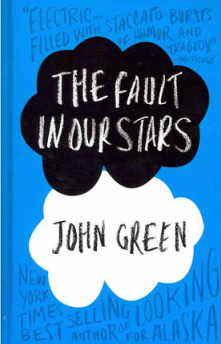On Chapter One I learned that the main character, Hazel, is a sixteen-year-old cancer survivor. Her tumor had shrunk but she had been living with “lungs that suck at being lungs” and an oxygen tank at tow all the time.
At Support Group she meets Augustus, a seventeen-year-old who had lost a leg but had no evidence of cancer for a while.
They start hanging out and gradually fall in love with each other, sharing their fears and dreams.
They think a lot about life and death – Hazel fears her death will devastate her parents’ lives and she struggles with the idea of “being a grenade”. For a while she avoids getting close to Augustus so that he won’t suffer when she passes.
Augustus fears oblivion and is obsessed with the idea of being remembered and of leaving a mark.
Here John Green touched one of the biggest and unanswered human musings: What’s the meaning and purpose of life? What’s the importance and impact of one human life? What are we supposed to do with our time here? Why bother, since we’re all going to die and be forgotten by the Universe?
We’re invited into Hazel and Augustus’ views on that as they come to terms with the fact that they will die young.
It was a nice read and I kept on turning the pages in order to know what was going to happen to them. However, the same thought occurred to me over and over as it did while reading Looking for Alaska: “What teenager talks like that?” I thought that maybe I’ve been misguided on “American teenage vernacular” by MTV and series but now that I’m reading other people’s reviews, I see that I’m not the only one who felt exasperated. They describe the characters as “wise beyond their years” and the dialogues as staged and unnatural and I couldn’t agree more. They say things like:
“I’m in love with you, and I know that love is just a shout into the void, and that oblivion is inevitable, and that we’re all doomed and that there will come a day when all our labor has been returned to dust, and I know the sun will swallow the only earth we’ll ever have, and I am in love with you.” – Augustus to Hazel
“I could imagine it. I could remember it. But I couldn't see it again, and it occurred to me that the voracious ambition of humans is never sated by dreams coming true, because there is always the thought that everything might be done better and again.” – Hazel
“It's a metaphor, see: You put the killing thing right between your teeth, but you don't give it the power to do its killing.” – Augustus, when he first meets Hazel and puts a cigarette in his mouth even though both of them had cancer and she dragged an oxygen tank with her all the time.
I’m going to stop here so that I don’t spoil the plot twist and the end, but keep an eye open because The Fault in Our Stars, the movie is on its way!



